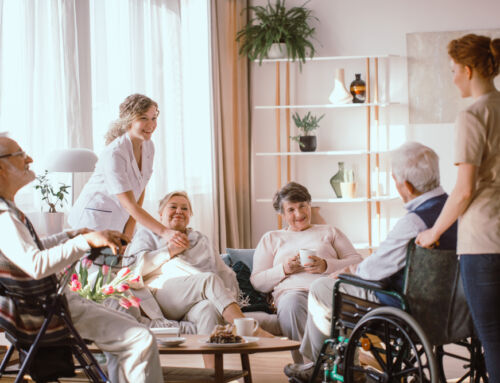I recently read a disheartening article about the prevalence of ageism in the healthcare system in this country. Age discrimination and bias is a longstanding issue — one that has had a light shined upon it during the pandemic. Poor treatment of seniors in nursing homes and crisis care standards that withheld healthcare resources from patients simply because of age are just a few examples of ageist treatment of older people we’ve witnessed over the past 18 months.
This particular article recounted the experiences of numerous seniors in routine or emergent healthcare settings who experienced discrimination or demeaning, dismissive treatment as a result of their age — people who were denied pain management medications; people who were talked down to; people whose concerns were ignored. I can imagine that even the various types of care settings at retirement communities are not immune to these issues.
Unfortunately, it’s an all-too common story, but what is the true cost — in both dollars and wellbeing — of such ageism? And what can be done about age-related biases in healthcare settings?
>> Related: Is Aging in Place the Better Option After the COVID-19 Pandemic?
Ageism in healthcare is not a new problem
In 2020, researchers at Yale University examined 422 studies related to ageism from 1970 to 2017. These studies encompassed datasets related to age discrimination and health outcomes from 7 million seniors in 45 countries. Concerningly (though perhaps not surprisingly), the Yale researchers found that ageism negatively impacted older people’s health in 96 percent of the studies they looked at.
Overall, analysis of these 422 studies revealed that ageism was correlated to worse health for seniors on 11 different measures, some structural and some individual.
Structural level:
- Denial of access to health care
- Exclusion from clinical trials
- Having resources, including medical services, rationed because of their age
- Limited work opportunities
Individual level:
- Decreased longevity
- Poorer quality of life
- Compromised social relationships
- Risky health behaviors
- Mental illness
- Cognitive impairment
- Physical illnesses
One of the lead researchers, Becca Levy, professor of epidemiology at Yale School of Public Health, noted that the issue was widespread. “We found evidence of ageism in every country we looked at, every year we looked at, and in every health domain we looked at,” Professor Levy said. “The pervasiveness of it I found disturbing.”
For instance, in 85 percent of the studies they examined, ageism was associated with older people being denied access to healthcare treatments. In a whopping 95 percent of the studies, there was evidence that ageism was tied to mental health conditions like depression, including increased depressive symptoms over time.
While ageism was found across all ages, genders, and ethnicities the Yale scientists looked at, they did find that seniors who were less educated were even more likely to be the targets of age discrimination in the healthcare setting. Less educated seniors also were especially likely to experience negative health consequences as a result of this ageism.
>> Related: The Invisible Senior: Confronting Ageism in the U.S.
The cost to people and society
The ageism experienced by seniors in healthcare settings has costs to both people’s individual health outcomes and monetary/economic costs to society at large, the Yale analysis found.
For example, in some of the studies the researchers examined, they discovered that medical practitioners frequently made decisions that limited patients’ access to care based simply on the patient’s age rather than on their actual healthcare needs. This bias is likely subconscious in many cases, but it is easy to imagine the real-world impact that such decisions could have on a person’s health outcomes and wellbeing.
Another example of age discrimination cited by the Yale study was the frequency with which older patients were excluded from clinical trials. Clinical research and trials are essential to the advancement of medicine, but they also allow patients with a host of medical conditions to potentially benefit — at no cost to them — from highly advanced treatments that are not yet available to the general population of patients. Some of these treatments can be life-extending or life-saving, so denying seniors access to trials that are relevant to them is yet another case of ageism in healthcare.
On the economic front, there are tangible costs to all types of age bias within care settings as well. The Yale researchers determined that one in every seven dollars spent each year on older Americans’ healthcare for eight of the costliest health conditions was attributable to ageism. That comes to $63 billion each year in the U.S. alone.
>> Related: Encouraging and Supporting the Creation of Age-Friendly Cities
Confronting the issue
Society as a whole has work to do to change negative attitudes about age and aging. But specifically, how do we address the systemic ageism that clearly is plaguing our healthcare system in this country? It is a complex problem without simple solutions, but given the human and economic costs, it is one we must endeavor to solve.
The Yale study’s data found that a crucial step toward reducing ageism in care settings begins with educating healthcare professionals about the problem. In many cases, the age bias of care providers is subconscious and unintended. For instance, a doctor or nurse may talk more loudly to an older person, simply assuming that they are hard of hearing. Increasing people’s awareness of the ageism issue and sharing examples of how older patients experience it can help healthcare providers recognize it in themselves and change behaviors for the better.
Seniors at the individual level are able to combat ageist attitudes as well, the researchers discovered. Their analysis found that seniors who held a more positive perception of their age and rejected society’s negative stereotypes about aging had lower rates of anxiety and less suicidal ideation. This is especially significant given that the Yale study found an estimated 6.33 million cases of depression among older people tied to the ageism they’ve endured.
>> Related: Learn specific ways seniors can adopt a healthier mindset about the aging process.
Use your voice to create change
When it comes to combatting ageism in healthcare settings, I would suggest that there is something else seniors must do: find ways to speak up and advocate for themselves.
When you make a healthcare provider aware of their ageist behaviors — for example, noting that you can hear just fine, and they do not need to speak more loudly than normal — you can become an advocate for change. If you feel that a care provider is still treating you in a discriminatory matter because of your age, ask to speak with a supervisor and/or ask to be treated by a different provider. You deserve to be treated with dignity and respect and to receive care that is appropriate for your condition.






